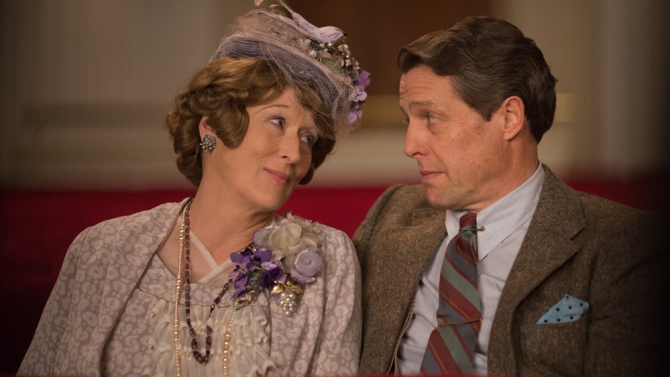
The New York City arts doyenne turned amateur soprano is arguably the strangest footnote in music history. In the early ’40s, Jenkins warbled off-key coloratura at select private performances for friends, vetted club members and the hard of hearing, finally landing the astonishing 1944 Carnegie Hall performance whose ridicule by professional critics broke her heart, and worse.
Stephen Frears’ Florence Foster Jenkins, the second film of 2016 to dramatize her story (France’s Marguerite came first), disappointingly jettisons the question of Jenkins’ genuine popularity among a sizable segment of listeners, both during her life and posthumously, failing to explain the so-bad-it’s-good phenomenon. Instead, it presents her legacy as a false binary choice between the haters and the co-conspirators — the snooty wags who lived to denigrate and the protectors who knew the truth but would never verbalize it.
Frears’ film is, however, an acting showcase rife with good humor and occasional pangs of pathos. We first see Jenkins (Meryl Streep) wordlessly acting in chintzy tableaux for the patrons of her upper-crust culture club. Her common-law husband St. Clair Bayfield (Hugh Grant, doing his Hugh Grant thing), presented in the film as a cut-rate Shakespearean ham, hosts the tacky program, preceding his wife’s appearance with a stilted reading from Hamlet. Then Florence, decked out in angel wings, descends from the unstable rafters of a rickety theater to a small burst of geriatric applause, as three men working the offstage pulleys heave and huff.
This is unglamorous work, the film seems to be saying, enough to entice a wannabe soprano out of such showbiz scutwork and into the spotlight again, despite her illness: Jenkins suffered a lifelong battle with syphilis, and every step forward in her career coincides with a step back in her health. But she forges ahead anyway, torpedoes be damned.
Frears can be something of a ham himself. Recognizing our anticipation for finally hearing that distinctively piercing voice, he milks its introduction for all it’s worth. When it finally arrives, it doesn’t disappoint, with Streep adding tin and rust to her golden pipes. Rehearsing at home with her infinitely patient and tactful vocal coach (Allan Corduner) and her newly hired piano accompanist, Cosmé McMoon (Simon Helberg, in a breakthrough performance), Jenkins’ voice is spectacularly wayward. Streep sounds, at various times, like a dog’s squeak toy, dying sparrow, a broken party favor and a dyspeptic mouse.
Manna for masochistic ears, these scenes will rightly be met with a cavalcade of laughs, but expect them to decrease as the movie wears on and builds respect for its heroine. Frears and his screenwriter, Nicholas Martin, rightly avoid treating Jenkins like a clown — offering, with generous assistance from Streep, a three-dimensional figure whose kindness, love for music and, yes, naivete overcame her tone-deafness. As her husband remarks to an initially dismayed McMoon, “A few wrong notes can be forgiven, but playing without passion cannot.”
Yet more important, perhaps, than Jenkins’ life story and motivations, is the class commentary that undergirds Florence Foster Jenkins. She lived in a bubble, cosseted from reality by wealthy urbanites paid to feed her delusion. Most of us, then and now, sound far more like Florence Foster Jenkins than we do Maria Callas, but none of us, regardless of our charity or our gusto, would be invited to play Carnegie Hall. This is a film about the luxuries of wealth and influence.
The movie’s climax should have been that epic, sold-out concert, which was attended, apparently, by Cole Porter, Tallulah Bankhead and a clutch of reviewers both friendly and brutal. But the closing scenes skid off the rails of credibility. Frears extends an absurd amount of suspense to St. Clair’s efforts to prevent his wife from seeing a negative review of her concert in the New York Post, lending this sweet dramedy the silly air of a madcap caper. The rest, angling for Oscar nods, is unnecessarily maudlin, straying from the emotional honesty and forthrightness that made Florence Foster Jenkins America’s favorite bad singer.
FLORENCE FOSTER JENKINS. Director: Stephen Frears; Cast: Meryl Streep, Hugh Grant, Simon Helberg, Rebecca Ferguson, Nina Arianda; Distributor: Paramount; Rating: PG-13; Opens: Friday at most area theaters